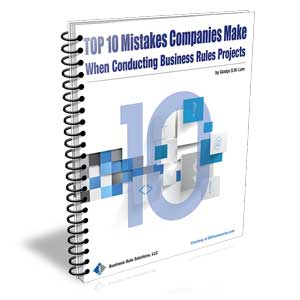From Concepts to Business Knowledge Blueprints: What Concept Models Are
Extracted from Business Knowledge Blueprints: Enabling Your Data to Speak the Language of the Business, by Ronald G. Ross, 2020.
http://brsolutions.com/business-knowledge-blueprints.html
A concept is a unit of knowledge. It is something conceived in the mind — an idea abstracted from particular instances. There can be a concept for anything you can perceive or conceive, from customers to the Eiffel Tower to unicorns. A concept is always in your mind.
Because a concept exists in your mind, it doesn't automatically come with words (or at least you can't prove it does, one way or the other). Somewhere along the way you'll have to add the words on. Those are your terms and definitions. That's the hard part because words allow other people to judge whether your concepts make sense.
Computer scientists are eager to standardize representations of concepts. To them, symbols (e.g., words and word syntax) are the real deal. (Think computer languages.) The fluffy stuff in people's minds is inaccessible. Sure. But computer scientists are not primarily concerned with the challenge of effective business communication per se, or running an actual business. Communication of knowledge between people is hard!
Sooner rather than later, adding words onto concepts may also allow machines to judge whether your concepts make sense. We need such help worse than we know! So, looking ahead a central goal is for your concepts to be consumable by both humans and machines.
What is a Concept Model?
Think of a concept model as a collection of conceptual buckets into which you can place like things. That notion is called classification. For example, Isaac Newton, Albert Einstein, and Marie Curie are enough alike in certain respects to be classified as scientists.
To classify things properly, you need to be very clear about why things go into each conceptual bucket. So, each conceptual bucket is associated with explicit criteria for what things can be placed within it. Those criteria are called definitional criteria and include definitions and definitional rules. For any given conceptual bucket, the definitional criteria collectively represent a concept.
A concept model organizes your concepts structurally. Your concepts don't exist in isolation — they naturally relate to each other. For example, mammal relates to animal. Orders are placed by customers. To relate things properly, you need to understand how things can be related in the business.
Here then is how we define a concept model:
concept model: a set of concepts structured according to the relations among them
What is a Business Knowledge Blueprint?
A concept model, like individual concepts, is in the mind. Obviously, it needs to be represented outside the mind to be of much use. A concept model is represented in the form of a business knowledge blueprint, which includes vocabulary, definitions, definitional rules, and (usually) diagrams.
We define a business knowledge blueprint as follows:
business knowledge blueprint: a concept model along with everything that communicates its meaning, including vocabulary, definitions, definitional rules, diagrams, and related information such as examples, descriptions, notes, and references
A business knowledge blueprint is without peer as a pragmatic basis for developing a high-quality business vocabulary, as well as a multi-purpose blueprint to your company's business knowledge. It's also an information architect's best friend.
# # #
About our Contributor:
Online Interactive Training Series
In response to a great many requests, Business Rule Solutions now offers at-a-distance learning options. No travel, no backlogs, no hassles. Same great instructors, but with schedules, content and pricing designed to meet the special needs of busy professionals.











How to Define Business Terms in Plain English: A Primer
How to Use DecisionSpeak™ and Question Charts (Q-Charts™)
Decision Tables - A Primer: How to Use TableSpeak™
Tabulation of Lists in RuleSpeak®: A Primer - Using "The Following" Clause
Business Agility Manifesto
Business Rules Manifesto
Business Motivation Model
Decision Vocabulary
[Download]
[Download]
Semantics of Business Vocabulary and Business Rules